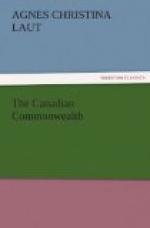II
Well—Laurier came to power; and he gathered into his Cabinet all the grand old guard free-traders still alive. As soon as the Manitoba School Question was settled Laurier put his Manchester school of politics into active practice by granting tariff concessions on British imports. The act was hailed by free-trade England as a tribute of statesmanship. Laurier and Fielding were recognized as men of the hour. The next step was to carry out the promises of reciprocity with the United States. One can imagine Sir John Macdonald, the old chieftain of the high-tariff Conservatives, turning over in his grave with a sardonic grin—“Not so fast, my Little Sirs!” When twitted on the floor of the House over a high tariff oppressing farmers and favoring factories, Sir John had always disclaimed being a high-tariff man. He would have a low tariff for the United States, if the United States would grant Canada a low tariff—he had answered; but the United States would not grant Canada any tariff concessions. And the grand old guard of Whigs had jeered back that he was “a compromiser” and “a trimmer,” who tacked to every breeze and never met an issue squarely in his life.
If the Liberals had not been absolutely sincere men, they would not have ridden to such a hard and unexpected fall. They would, like Sir John, have trimmed to the wind; but they believed in free trade as they believed in righteousness; and they furthermore believed all they had to do was to ask for it to get it. Blake had retired from Canadian politics. George Brown of the Globe was dead; Alexander MacKenzie had long since passed away; but the old guard rallied to the reciprocity cry. International negotiations opened at Quebec. They were not a failure. They were worse than a failure. They were a joke. High tariff was at its zenith in the United States. Every one of the American commissioners was a dyed-in-the-wool high-tariff man. It would be an even wager that not one man among them had ever heard of the Cobden-Bright Manchester School of Free




